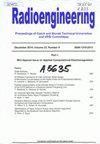Design of Bifurcated Beam using Convex Bent Array Feed for Satellite Mobile Earth Station Application
IF 0.7
4区 工程技术
Q4 ENGINEERING, ELECTRICAL & ELECTRONIC
引用次数: 0
Abstract
. For multibeam operation at the satellite mobile earth station and telecommunication base stations, a cylindrical lens antenna with multi-feed is a promising candidate due to the simple antenna configuration and good scanning performance to produce multi beams. However, efficient illumination at the lens surface is critical. Previ-ously, the present antennas were used; however, a significant tapered distribution is observed, resulting in under-illumination at the lens edges. The feed positions are re-quested to be placed near the lens to achieve a slender lens form. Therefore, the feed radiation pattern should have high radiations at the wide-angle region. This paper proposes a bifurcated beam array antenna to alter the amplitude distribution. This method is expected to improve the radiation pattern coverage area. In designing a bifurcated beam antenna, the important parameter is to ensure that the separated beams have the same current phase excita-tions at each radiating element and a precise patch arrangement to achieve the targeted radiation pattern. The differences in surface current will affect the radiation patterns due to the significant interference and cancellation effects which will contribute to high losses. This paper forms the array by a convex bent array with the same phase excitation for all patch elements. The feed performances are also verified by the good agreement between simulated and measured results. An improved aperture distribution is demonstrated for array feed having 0.7λ o spacing compared to the tapered distribution by a single patch design with the hyperbolic lens through detailed analysis and comparative study. By changing the spacing distance of the convex bent array, many radiation patterns are observed, such as strong radiation in the wide-angle region, the uniform radiation level in a wide-angle region, and the tapered radiation pattern. Thus, many aperture distributions of center-dip, uniform and tapered, are achieved.卫星移动地球站应用凸弯曲阵列馈电的分叉波束设计
对于卫星移动地球站和电信基站的多波束操作,具有多馈源的柱面透镜天线是一种很有前途的候选天线,因为它具有简单的天线配置和产生多波束的良好扫描性能。然而,透镜表面的有效照明是至关重要的。以前,使用了现有的天线;然而,观察到显著的锥形分布,导致透镜边缘的照明不足。馈送位置被要求放置在透镜附近,以实现细长的透镜形状。因此,馈送辐射图案应该在广角区域具有高辐射。本文提出了一种分叉波束阵列天线来改变振幅分布。该方法有望提高辐射图案的覆盖面积。在设计分叉波束天线时,重要的参数是确保分离的波束在每个辐射元件处具有相同的电流相位激励,以及精确的贴片布置,以实现目标辐射方向图。由于显著的干扰和抵消效应,表面电流的差异将影响辐射方向图,这将导致高损耗。本文通过对所有贴片单元具有相同相位激励的凸弯曲阵列来形成阵列。仿真结果与实测结果吻合良好,也验证了进料性能。通过详细的分析和比较研究,证明了与双曲透镜单贴片设计的锥形分布相比,0.7λo间距的阵列馈电的孔径分布有所改善。通过改变凸形弯曲阵列的间隔距离,可以观察到许多辐射图案,例如广角区域中的强辐射、广角区域中均匀的辐射水平和锥形辐射图案。因此,实现了许多中心倾角的均匀和锥形孔径分布。
本文章由计算机程序翻译,如有差异,请以英文原文为准。
求助全文
约1分钟内获得全文
求助全文
来源期刊

Radioengineering
工程技术-工程:电子与电气
CiteScore
2.00
自引率
9.10%
发文量
0
审稿时长
5.7 months
期刊介绍:
Since 1992, the Radioengineering Journal has been publishing original scientific and engineering papers from the area of wireless communication and application of wireless technologies. The submitted papers are expected to deal with electromagnetics (antennas, propagation, microwaves), signals, circuits, optics and related fields.
Each issue of the Radioengineering Journal is started by a feature article. Feature articles are organized by members of the Editorial Board to present the latest development in the selected areas of radio engineering.
The Radioengineering Journal makes a maximum effort to publish submitted papers as quickly as possible. The first round of reviews should be completed within two months. Then, authors are expected to improve their manuscript within one month. If substantial changes are recommended and further reviews are requested by the reviewers, the publication time is prolonged.
 求助内容:
求助内容: 应助结果提醒方式:
应助结果提醒方式:


